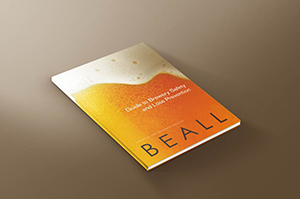When’s the last time you took a look at your brewery insurance package?
“We get it. Brewing is at the forefront of your mind, not your brewery insurance. Even though you know how important that insurance is,” says Richard Beall, principal at Beall Brewery Insurance, which works with craft breweries across the country.
“And we know that it’s not immediately obvious why an annual insurance review is important,” he adds. “After all, you selected the insurance you need to protect your business, right? So what’s the point of a review?”
Well, to put it simply, things change.
Your brewery may have invested in new equipment or materials like barrels for aging beers. Changes in the neighborhood around you—construction projects, for instance—could expose you to greater risk of property damage. Maybe when you first chose your insurance coverages, you were more focused on cost than on protection.
Consider the Southern California brewery that launched with only liability insurance—no commercial property insurance at all. So when a fire devastated the brewery, the owner turned to crowdfunding to try to raise the money needed for repairs.
“That’s not a situation any brewery operator wants to be in,” says Kristian Beall, AAI. “But busy brewery professionals don’t always realize the risk to which they’re exposing the business. And they may not know that a few simple changes can offer them far more robust protection.”
Brewery Insurance Review Pointers
The first thing you want to check for is coverage in the following areas:
- Spoilage and contamination protection for ingredients and finished product.
- Commercial property coverage to protect brewing equipment.
- Commercial general liability coverage to protect the business from liability claims.
- Liquor liability coverage to protect the brewery from liability if someone gets injured in an incident after drinking the brewery’s beer.
- Workers’ compensation for employees working in brewing, bottling, packaging, and transporting craft beer.
You will also want to check your coverage limits. For instance, standard spoilage and contamination coverage might total $25,000. But would that be enough to cover your losses if you have to dispose of (or recall) a batch of contaminated beer? Is the value of contaminated beer based on the selling price, so your profit is also protected?
Questions to Consider During Your Brewery Insurance Review
Ask yourself the following questions to ask to ensure that your craft brewery will be secure in the face of disaster.
- Do you have coverage for sewer or drain backup?
- If one of your suppliers couldn’t make deliveries, do you have coverage for any resulting extra expense?
- If you store raw materials or equipment in outbuildings, do those structures have coverage for damage?
- Does the brewery have coverage for electronic vandalism and interruption of computer operations?
- Does your policy include coverage of foundation and pipe repairs?
- If you transport raw materials to the brewery, or finished product to bars or restaurants, do you have in-transit coverage to protect that exposure?
- If spoilage or contamination occurs to your raw materials or finished product, does your policy cover that?
- Does your policy cover repair or replacement of failed equipment, or risk prevention services to prevent breakdown?
- Does your policy provide for expenses incurred for recall of your finished product?
Next Steps
If you’re not sure of the answers to these questions—or the answer to any of them is no—make an appointment with your brewery insurance agent. Then you can thoroughly review your policy together, and make any necessary changes.
“A brewery insurance review may not be the most exciting task you take on this year—but it could be one of the most important,” says Kristian Beall.
“The time to review your policy—and make any necessary changes to protect your business—is now, before you need to file a claim.”
Beall Brewery Insurance offers a nationwide insurance program tailored specifically for today’s breweries. Our customized solutions will meet your budget and protect your business, leaving you able to focus to do what you do best: brewing great craft beer.


